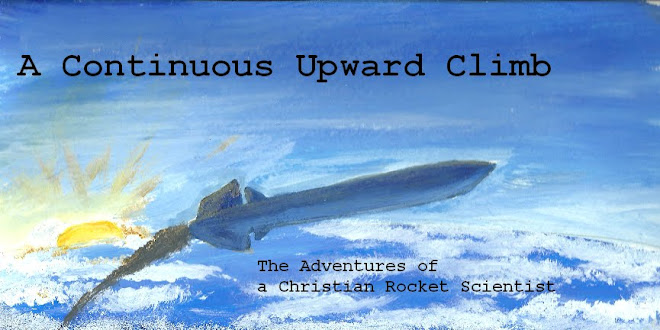"Aerospace Engineering?
I'm considering a major in aerospace engineering. Does anyone have any experience in it, or know anyone who does it?"
- A question by Tim Smith, which I answered 7/23/12 at 12:33 in the morning, on Yahoo Answers:
YUP!! I love aerospace engineering. Here's my take:
I first got interested in it through a model rocketry project I did in 4H. It was a scratch-built little rocket that didn't fly straight, and I wondered why. It motivated me to borrow a book from the library on the subject, and learned that my rockets were unstable. I dug deeper and deeper, and in one summer I had my entire life figured out, and wanted to build spacecraft.
Connecting the dots, I found out about an aerospace engineering major. I ended up going to Iowa State (after some recommendations about their aerospace program, I figured it was a good compromise). Iowa State is a slightly different experience than you might find at another school, because you get hands on, major-related courses freshman and sophomore year as well as junior and senior.
Aerospace engineering deals with vehicles that interact with a medium, and is typically subcategorized by aeronautical and astronautical engineering, which deal with airplanes and rockets, respectively. First two years you'll dabble in both disciplines until you have a narrower focus. Me, I'm making a beeline for R&D in rocket propulsion. An efficient propulsion system is key to a feasible space mission. My ultimate passion is for manned deep-space exploration, and someday I hope I can work on the spacecraft that lands man on Mars.
Right now I'm putting together a list of companies I would love to intern for before or just after I graduate. The list currently has 20+ companies which includes SpaceX, XCOR, Boeing, Lockheed Martin, virtually any NASA center, and other companies competing in NASA's CCDev initiative. I'm also looking at small companies that are building suborbital spacecraft, or competing in the Google Lunar X-Prize.
Some people say that aerospace engineering is one of the most difficult engineering disciplines. It is, after all, rocket science. My response to that, however, is that if it's what you love anyway, it will be play and not work. The great joys of aerospace engineering far outweigh the difficulties of heavy mental engagement.
If you're curious about typical salaries, a typical entry-level salary is roughly in the ball-park of $60,000. After ten years working for a company, maybe six figures. It depends, though. If you go into the private space industry, your starting pay may be smaller, but with greater opportunities for future increase. If you go into the civil space industry (i.e. NASA), your starting pay will be much greater, but won't increase as fast. Like most engineering jobs, it pays fairly well because it's a marketable skill. I'm just lucky enough that what I love to do just "happens" to pay well. One thing that you will never have, however, is job security. The aerospace industry is usually pretty turbulent (no pun intended).
That's my story! Sorry if it is more information than you bargained for. I hope you dig deeper and like what you find. We could use you! We could use a more aerospace-oriented economy. But maybe I'm a little biased. Good luck deciding!

1 comment:
Very informative blog regarding the duties and responsibilities if aerospace engineer. Designing and development of space shuttles, satellites, rockets, remote sensing equipments and all their communication receptors and emitters requires the expert arms of an electrical and aerospace engineer. The aerospace engineering is otherwise known as rocket engineering. The research of new equipments and up gradation and maintenance of the current systems are vital in a space research organization. The engineers who are working under the development of space vehicles are often known as “rocket scientists”.
The average salary of an electronic and aerospace engineer ranges from $60,000 to $110,000. Read more about the aerospace engineer by visit http://aerospaceengineeringsalaries.com/
Post a Comment